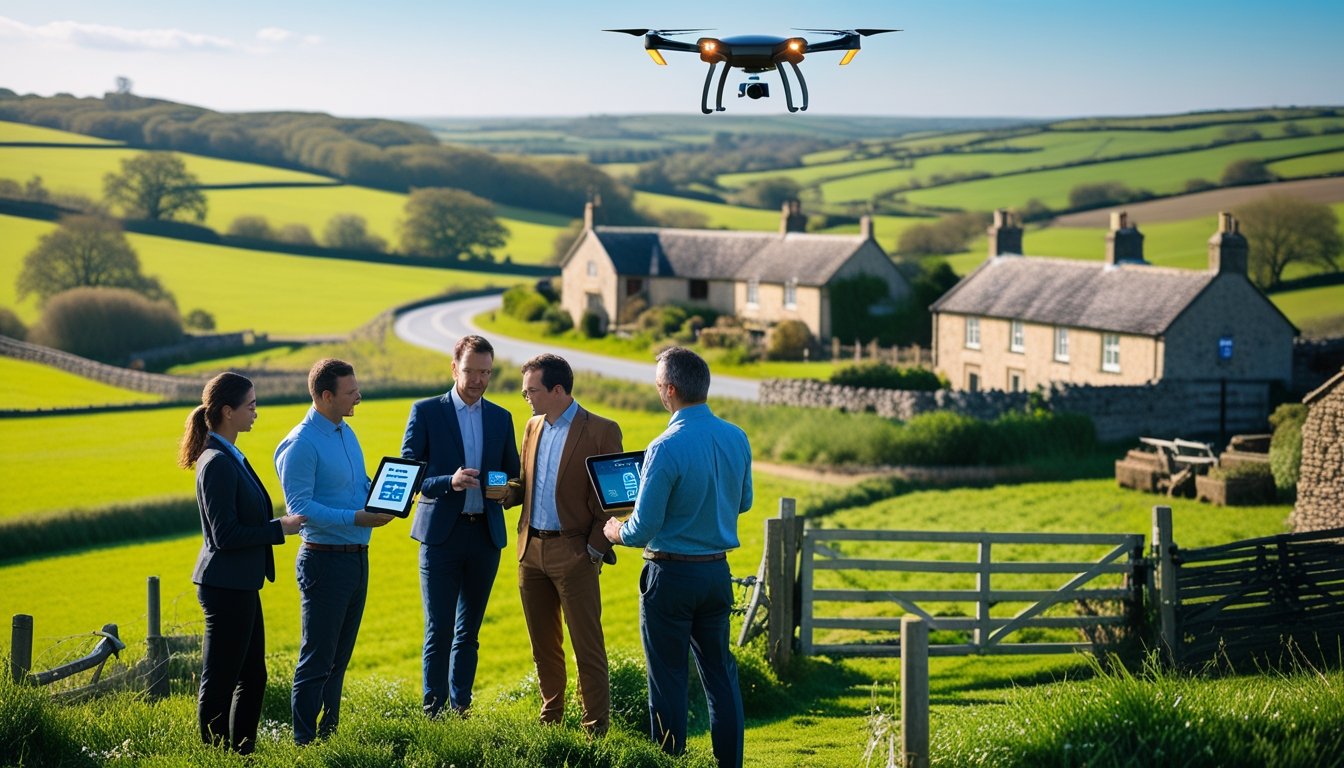Late updated: 29 May 2025 11:05
Written by: Oliver Bennett
Understanding AI's Impact On UK Countryside Connectivity: Enhancing Rural Networks
Artificial Intelligence (AI) is reshaping the landscape of the United Kingdom, extending its influence from bustling cities to the tranquil countryside. The impact of AI on the UK countryside goes beyond just economic uplift. One of the most significant benefits is the enhancement of connectivity, allowing rural communities to leverage new technologies for improved communication and access to services. By integrating AI tools, these areas can enjoy better access to resources, fostering growth and development in ways previously unimagined.

AI-driven solutions are opening up new opportunities for rural areas by transforming how we connect and interact with the world. From AI-enhanced internet services to smart agricultural practices, our countryside is on the brink of a technological revolution. As the UK progresses towards an AI-integrated future, the prospects for rural communities are both exciting and challenging. Balancing these opportunities with concerns over security and policy remains essential to ensure sustainable growth.
Key Takeaways
- AI is improving connectivity in rural UK areas.
- New technologies offer growth and development opportunities.
- Balancing progress with security and policy is crucial.
Transforming UK Countryside Connectivity With Artificial Intelligence
Improving rural connectivity in the UK involves the integration of artificial intelligence, shifting the landscape of infrastructure, technology, and adoption approaches. We explore how AI-enhanced solutions are reshaping digital capabilities and the challenges faced in rural areas.
Infrastructure and Digital Technology Advances
The UK countryside's digital infrastructure is critical to advancing connectivity through AI. The implementation of broadband networks and 5G technologies ensures that rural areas are connected to high-speed internet. Edge computing is also emerging as a game-changer, enabling data processing closer to users for faster responses and improved performance.
Incorporating AI and the Internet of Things (IoT) into infrastructure allows for smart applications in everything from agriculture to local services. Cloud platforms and scale AI solutions optimise the use of data collected from sensors and devices, enhancing decision-making and efficiency. This infrastructure expansion lays the groundwork for integrating AI across rural sectors.
Emerging AI Applications in Rural Connectivity
AI applications are redefining what is possible in rural connectivity. In agriculture, sensor networks and machine learning algorithms offer precision farming, optimising resources and increasing yields. Smart grids powered by AI predict energy needs and manage supply more effectively, contributing to sustainability goals.
AI also plays a role in rural healthcare through telemedicine and real-time patient monitoring, closing the gap in healthcare access. Advanced AI systems enable autonomous vehicles and drones, transforming logistics and delivery services in hard-to-reach areas. These applications extend the potential of AI to various sectors and improve quality of life.
Barriers to Digital Adoption and AI Integration
Despite the progress, several barriers limit digital adoption and AI integration in rural UK. Infrastructure investments can be significant, and aligning public and private sector efforts is essential. There’s often a digital skills gap in rural areas, which hinders technology adoption and utilisation.
AI solutions require substantial data processing power, which involves investments in GPUs and ASICs. Privacy concerns and regulatory challenges also pose barriers. Overcoming these challenges demands collaboration and strategic initiatives, ensuring rural communities can fully embrace the benefits of AI and emerging technologies.
Opportunities, Security, and Policy in the UK’s AI-Driven Countryside

AI technologies are reshaping connectivity in the UK countryside, influencing areas such as governance, skills development, and security. Effective regulation and ethical governance, targeted upskilling, and robust protection measures are key to navigating these changes.
AI Governance, Regulation, and Ethics
The UK government plays a vital role in AI governance by implementing regulations that ensure transparency, accountability, and ethical AI practices. Bodies such as Ofcom and the Financial Conduct Authority are crucial for creating a robust regulatory framework that promotes fairness and contestability.
Our commitment to responsible AI use helps establish trust and public confidence. By prioritising explainability and redress mechanisms, we address potential security risks and enhance the integrity of AI systems. Ethical considerations, including privacy and data management, must be integral to UK policy-making.
Skills, Upskilling, and Rural Talent Development
Building a digitally skilled workforce in rural areas is essential to maximising AI's potential. Through upskilling initiatives, we can empower local talent to engage with AI technologies efficiently. Collaborations between the public and private sectors are pivotal for offering training programmes tailored to rural communities.
Investing in these programmes ensures the development of AI talent in the countryside, fostering an environment conducive to innovation and growth. By prioritising digital literacy and skill development, we better prepare our workforce for an AI-driven future.
National Security, Safety, and Data Protection
National security is a crucial concern as AI technologies evolve. Ensuring the safety and security of AI systems involves addressing cybersecurity risks and disinformation. The Ministry of Defence plays a leading role in integrating AI for defence while maintaining autonomy and robustness in our national security strategy.
Data protection and privacy principles are essential to secure sensitive information. Establishing comprehensive safety protocols, we enhance the resilience of AI systems, securing our countryside's future. Collaboration with initiatives like the AI Safety Institute ensures that safety and data protection remain at the forefront of our national AI agenda.
Frequently Asked Questions

Our exploration of AI's impact on rural connectivity in the UK countryside reveals its pivotal role in advancing broadband development, transforming agriculture, contributing to economic growth, and addressing the digital divide.
What effect has artificial intelligence had on broadband development in rural UK areas?
AI has significantly enhanced the efficiency and precision of network planning. By analysing vast amounts of data, AI facilitates the optimal placement of broadband infrastructure. This leads to faster internet speeds and more reliable connections for rural communities, bridging a critical gap in connectivity across the UK countryside.
How is AI integration transforming agricultural practices in the UK countryside?
AI technologies have introduced precision agriculture techniques that revolutionise farming. Through data analysis, AI optimises planting schedules, monitors soil conditions, and predicts crop yields. This enhances productivity and sustainability in rural farming communities while ensuring better resource management and reduced environmental impact.
To what extent is AI contributing to economic growth in rural communities within the UK?
AI is a catalyst for economic development in rural areas by enabling new business models and job opportunities. It supports local enterprises through automation, data-driven decision-making, and improved logistics. These advancements are critical in making rural economies more resilient and competitive in an increasingly digital marketplace.
What measures are UK policymakers implementing to ensure AI advancements benefit rural connectivity?
Policymakers are rolling out initiatives to promote AI adoption, such as funding for rural broadband projects and AI-driven technology in agriculture. Regulatory frameworks are being developed to ensure AI solutions are accessible and beneficial to rural populations. This strategic focus aims to bring equitable technological benefits to all regions.
Can artificial intelligence address the digital divide between urban and rural regions in the UK?
AI presents promising solutions to the digital divide by identifying gaps in connectivity and optimising resource allocation for infrastructure development. By making internet access more accessible and affordable in remote areas, AI helps bridge this gap, ensuring that rural residents enjoy similar digital opportunities as those in urban settings.
How will AI-driven technologies likely shape the future of the UK's countryside infrastructure?
The future landscape of rural infrastructure will be vastly influenced by AI as it continues to drive innovations in connectivity and transportation. AI’s data-driven insights allow for the development of smart infrastructure, which includes autonomous vehicles and energy-efficient systems, ultimately improving the quality of life in the UK countryside.
